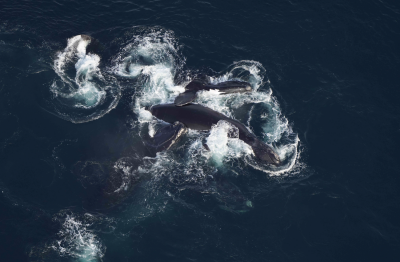The right whale stuff
The endangered northern right whale is once again making news. The Washington Post reported on May 1 that the federal Office of Management and Budget had a year ago placed a hold on a rule that would require cargo ships to reduce speed to 10 knots at certain times and in certain places to lessen the likelihood of fatal collisions between boats and these endangered whales.
The Post's reporting was based on documents obtained by the Union of Concerned Scientists.
Lending sensation to the story was the invocation of the Great Bogeyman, Vice President Dick Cheney, whose office, along with the Council of Economic Advisers, has reportedly questioned the need for the rule.
According to the Post, the Council of Economic Advisers performed its own analysis and determined that "the relationship between [vessel] speed and [whale] injury... may not be as strong of a relationship as is suggested in published papers."
The story has caused something of an uproar among lobstermen, who are hoping that someone will put a hold on the requirement, designed to protect whales, that they get rid of their floating groundlines.
The affair has been a trifecta for editorial writers in New England, affording them an opportunity to champion an endangered species, stick it to the fishing industry and bash Cheney, all in the same paragraph.
"The lobstermen are right to complain, but the shipping industry's reprieve should not in any way change the fishermen's duty," preached the Portland (Maine) Press Herald. "The issue is not fairness, but protecting the whales. The lack of progress in the shipping area should not influence any implementation delay for the trap-line rules."
The Cape Cod Times, of Massachusetts, was a little less restrained. "The right whales and other behemoths on Stellwagen Bank are the latest victims of the Bush administration's anti-science agenda."
Many observers believe ship strikes pose a much greater threat to whales than do interactions with rope floating near the seafloor.
And given the concern about the whales, it is true, as Patrice McCarron, executive director of the Maine Lobstermen's Association, says, that "any mortality to any individual whale hurts us all."
Trouble is, that is not the same thing as saying that slowing shipping down will save right whales, whose numbers, sadly, have diminished to 350 or so blubbery souls.
We have quarreled with Cheney in the past: The Post reported last year that in 2001, Cheney leaned on the National Academy of Sciences to ensure farmers near the Klamath River in California and Oregon had adequate water for irrigation, with disastrous consequences for salmon.
In this case, however, I am inclined to say "not so fast" to Cheney's critics, most of whom would find fault with the vice president if he were feeding the dolphins at Sea World out of his hands.
I don't question the impact of shipping on right whales, but I'm not convinced slowing down vessels at certain times will make a big difference in the health of the right whale population. Ships are said to strike three right whales a year, but how many of them are pregnant cows, which are at the heart of everyone's concern? Clearly we're talking about a very small number. Is the significance of the 40 percent reduction in strikes quantifiable?
I am not indifferent to the plight of right whales, but I don't think you can shrug off the economic costs of slowing, which the shipping industry has put at $116 million per year.
As Americans, we love an underdog, and if ever there was an underdog, it's the right whale. Moreover, there's no doubt we are in large part responsible for the right's precarious grip on existence. And last but not least, because we are idealists — which is a good thing — we bridle at the notion of putting a price tag on life.
But at some point we have to weigh costs versus benefits, factoring in the likelihood of success. That doesn't mean we should ram all the whales and get it over with, but it probably does mean that it's fair for the vice president to ask what benefit the right whale ultimately will derive from the shipping industry's $116 million.






